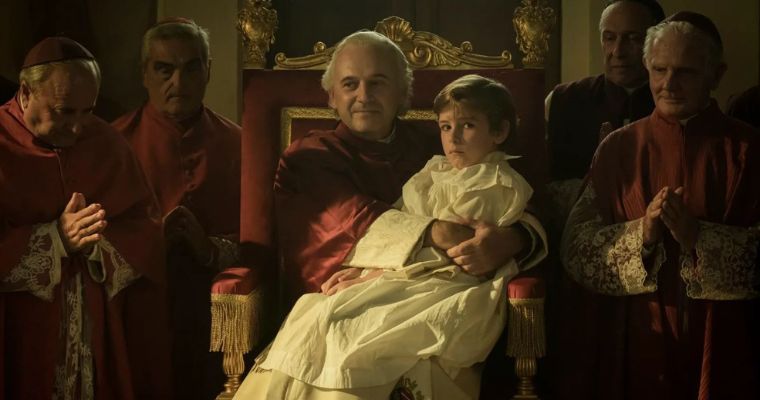
Paolo Pierobon as Pope Pius IX and Enea Sala as Edgardo Mortara in a scene from "Kidnapped." (Photo courtesy of 01 Distribution)
No cultural event comes out in a vacuum. So it goes for film festivals.
The 2024 Miami Jewish Film Festival is hovering just after the midway point at the time of this writing. The usual assortment of premieres, visiting filmmakers and sold-out crowds suggests prepandemic editions, though the two-week celebration of cinema and community remains a hybrid event, with more than 80 in-person showings and more than 80 virtual selections.
The numbers for this 27th edition are staggering: 94 feature films and 26 shorts from 25 countries, including 10 world premieres, 10 international premieres and 12 North American premieres. Forty-one of these films were directed by women, and 40 were helmed by first-time filmmakers.
Impressive stats. The only thing bearing more weight than these digits is the subject matter of so many of these films. Call it serendipity or a reflection of the times we live in, but MJFF 2024 is unspooling as war rages on between Israel and Hamas on the other side of the Atlantic. Fittingly enough, the five selections that this critic has viewed feel like they carry the weight of the world on their shoulders. The international features, all in contention for the 2024 MJFF Critics Prize, bring big words to mind, like “gravity,” “hard-hitting,” “sobering” and “pedigree.” Old masters behind the camera. Awards-season contenders. Polished production values.
What's in distressingly short supply this time around is levity. With one notable exception, these films dive into the past with an eye on the present. The Jewish people's struggles across the ages brings built-in conflict, a narrative hook that tends to hold viewers in thrall. And yet, I have come away with the sense that we are being offered one history lesson too many. There's another word that comes to mind: “monolithic.”
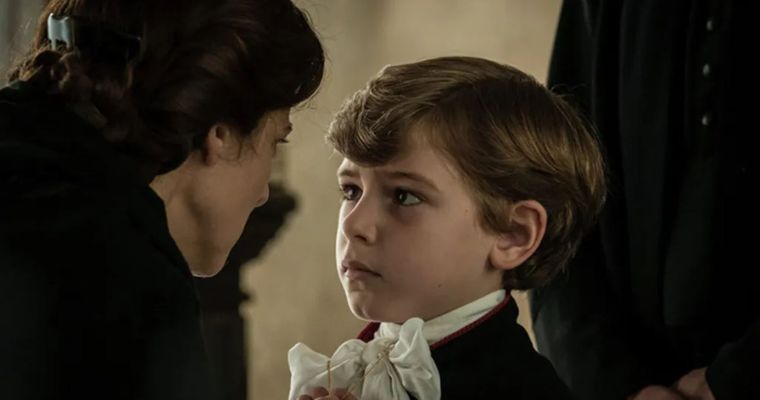
Barbara Ronchi as Marianna Padovani Mortara and Enea Sala as Edgardo Mortara in a scene from "Kidnapped." (Photo courtesy of 01 Distribution)
Variety is the spice of life, and while it may be on display elsewhere in the lineup, the tricky and byzantine politics of the film festival and distribution worlds that dictate which contenders receive the green light for awards consideration have yielded a mixed bag of titles that keep hitting that same note of self-serious purpose, so much so that one ends up jonesing for a little escapism.
[RELATED STORIES: MJFF's Building Bridges/Breaking Barriers
'The Catskills" Is Humorous Trip Down Memory Lane
Film Tells Holocaust Survivor's Story]
The question arises: are we voting for the best film, or the most important one? I know which side I fall on, the one that values personal histories over fact-based accounts that latch onto the words “based on a true story” for dear life. Get ready to hear this phrase often during the following capsule reviews.
“Kidnapped”: Puerto Ricans have a phrase they use often. “Ay bendito” roughly translates to “oh, blessed be,” used the way we would say “poor thing” when referring to an unfortunate situation befalling innocent people who did not deserve it. The latest period piece from renowned Italian director Marco Bellocchio is a feature-length panoply of "ay benditos.”
Set in the mid-19th century, “Kidnapped” traces the woes of the Mortara household, a large Jewish family that sees their world upended after Pope Pius IX (Paolo Pierobon) learns one of their children, 6-year-old Edgardo (Enea Sala), was baptized in secret as a baby by a maid. The pontiff orders the child removed from his home in Bologna and taken to Rome to be raised and educated in the Catholic faith under His Holiness' watchful eye. In other words, the Catholic Church gleefully twirls a mustache.
To his credit, Bellocchio does not shy away from the pain the boy's parents suffer, nor does he turn a blind eye to the Catholics' good intentions, even as they become intertwined with monstrous actions. The filmmaker, now 84, has always had a gift for making stories from a different time feel contemporary, and that quality does not fail him here. This is not a costume drama doused in formaldehyde. Case in point: a scenery-chewing Pierobon plays the pope as a man of God whose devotion is undermined by his massive ego. When this pontiff sneers, his nose quivers.
But while “Kidnapped” is not quite the arid history lesson it could have been in less capable hands, it can't quite shake that cinema-of-quality aura that tends to set my teeth on edge. (Pierobon does, indeed, appear to be starring in a more fun film than the one we're watching.) It's a clear-eyed exploration of faith and displacement that sees its attempts to make it feel like a painting come to life dashed by the limits of its digital shooting format.
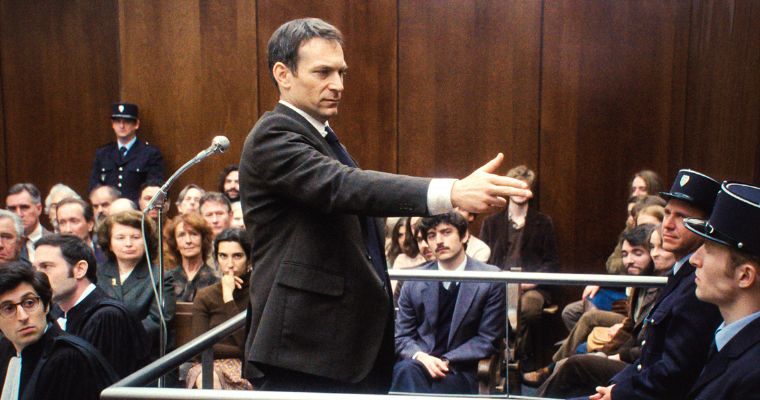
Arieh Worthalter as Pierre Goldman in a scene from "The Goldman Case." (Photo courtesy of Menemsha Films)
What redeems this reasonably watchable Cannes Film Festival selection, loosely based on Daniele Scalise's book “Il caso Mortara,” is the breadth of its scope. The film eventually jumps forward to portray Edgardo (Leonardo Maltese) as a young adult, leading to a scene that has echoes of Martin Scorsese's “Silence” in its depiction of fiercely held beliefs. This is when “Kidnapped” abandons its earthbound trappings and fully grapples with the damage that organized religion can and does inflict.
“Kidnapped” screens Sunday, Jan. 21 at 8 p.m. and Tuesday, Jan. 23 at 8:30 p.m. at Miami Theater Center in Miami Shores.
“The Goldman Case”: All the elements are in place for a gripping courtroom drama: a nifty 1970s setting, a committed cast, crisp editing and sharply lensed photography in the boxy Academy aspect ratio. But despite its strong grip on the real-life trial being dramatized, the latest effort from veteran French director Cédric Kahn makes you yearn for a movie that depicts the tumultuous events leading up to the titular character's day in court. To put it bluntly, this is a well-crafted feature-length exposition dump.
The year is 1976, and far-left militant and author Pierre Bernard Goldman (Arieh Worthalter) is in the slammer for a bunch of robberies. Problem is, one of the incidents he's accused of involved the fatal shooting of two women who worked at a pharmacy in Paris. Years after the string of violent events, his case is coming before a jury for a second time. The defendant, a Polish Jew who was born in France, admits having committed three of the robberies, but insists he had no role in the shooting of the pharmacists.
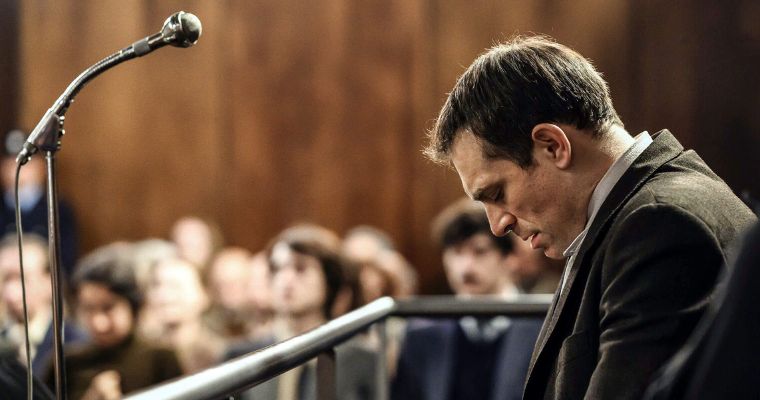
Arieh Worthalter as Pierre Goldman in a scene from "The Goldman Case." (Photo courtesy of Menemsha Films)
“Goldman” begins with great promise, as Georges Kiejman (Arthur Harari), the lawyer who reluctantly agrees to represent the defendant, laments his client's penchant for disruptive outbursts. Kahn delivers as promised, turning the courtroom into a powder keg of fraught nerves, pointed recriminations and shouting matches, fueled in part by the book Goldman wrote while behind bars.
But as the excitement dissipates over the boisterous circus that the trial becomes, the film uses witness cross-examinations to etch a portrait of Goldman's troubled childhood and increasingly violent political activism. Intriguing tidbits about his life like, for instance, his propensity for extravagant spending (he was, by his own admission, a “flambeur”), are mentioned and just lie there, stagnant, before Kahn moves on.
The filmmaker dangles the building blocks for a fascinating portrait, then spends the bulk of the movie glossing over them in the tidy confines of a courtroom. That uncanny feeling that you might not be able to put a finger on while seeing “Goldman” is listening to a radio play, only this one is peppered with slow camera zooms.
There are intriguing parallels here between the prejudice from French police in the 1970s and present-day antisemitism, but that urgency can only take Khan so far, especially when the entire film feels like a framing device. It just goes to show formal rigor, no matter how accomplished, doesn't necessarily equate insight.
“The Goldman Case” screens Wednesday, Jan. 23 at 7:30 p.m. at Michael -Ann Russell JCC in North Miami Beach.
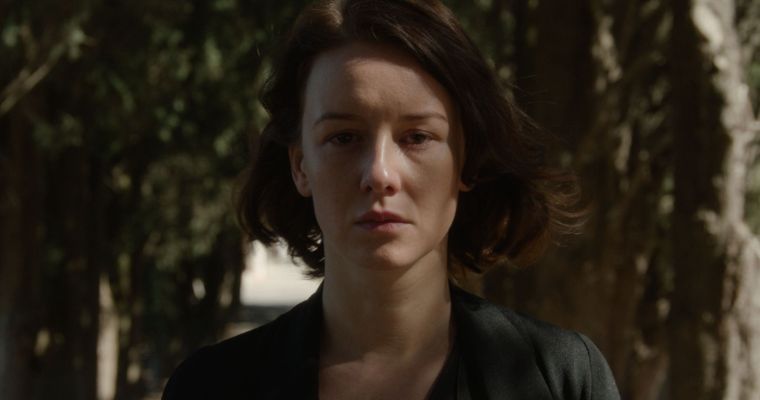
Irina Starshenbaum as Shoshana Borochov in a scene from "Shoshana." (Photo courtesy of Vision Distribution)
“Shoshana”: This middling political thriller, an episodic foray into the unrest in the late 1930s and early 1940s that led to the birth of Israel, is the poster child for everything that turns me off about prestige middlebrow endeavors that attempt to bring violent chapters of a country's history to life. But hey, the stars sure are photogenic and look oh so pretty together.
The British production ostensibly centers around the title character, Shoshana Borochov (Irina Starshenbaum), a journalist in British Mandatory Palestine who is torn between her Jewish identity and political convictions on one hand, and her love for Tom Wilkin, an English officer rising in the ranks in the Palestine Police, on the other. Their relationship is set against the turmoil of the Arab revolt and the rise of Irgun, an underground Zionist organization whose tendency to set off explosives in public places serves as a disturbing reminder of the turmoil that has persisted in the region all these years later.
“Shoshana” was a long-gestating project for its director, the prolific Michael Winterbottom, whom you might know from “The Trip” film series starring Steve Coogan and Rob Brydon, and the filmmaker takes pains to devote screen time to Shoshana and Tom's complicated bond. But in also trying to give a viewer what amounts to a crash course in Israeli history, the couple's romance falls through the cracks.
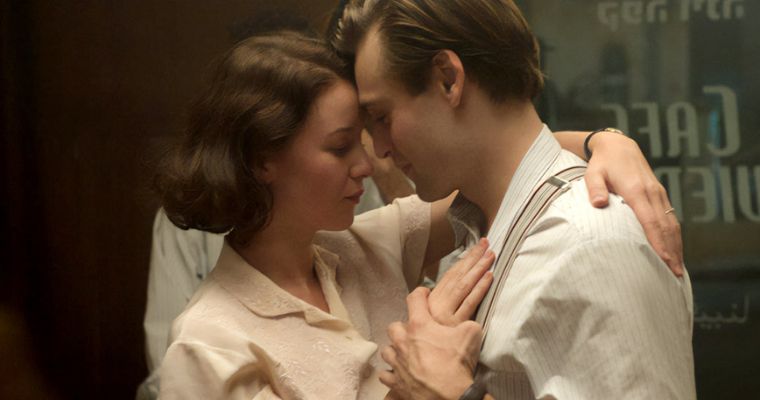
Irina Starshenbaum as Shoshana Borochov and Douglas Booth as Tom Wilkin in a scene from "Shoshana." (Photo courtesy of Vision Distribution)
Instead, the narrative becomes increasingly preoccupied with Tom (played by Douglas Booth, who bears a strong resemblance to a young Christopher Nolan), his by-the-book commanding officer Geoffrey Morton (the esteemed Harry Melling), and their attempts to catch Avraham Stern (Aury Alby), the Zionist freedom fighter who has put British authorities in his crosshairs. The film ends up feeling like a period remake of “The Departed.”
But what about Shoshana? She remains a considerably engaging character, a headstrong and stubborn young woman whose late father, Ber, was one of the founders of socialist Zionism and, in her words, dreamed of a world where Arabs and Jews could coexist in peace. Unfortunately, she ends up being sidelined for entire chunks of the film, becoming a supporting character in her own story. Even more problematic, the movie ends before her character takes on a more pivotal role in the founding of Israel, a fact that is reduced to a footnote.
“Shoshana” doesn't do right by Shoshana. She symbolizes Israel's spirit of independence, but as an individual, she erodes before our eyes, her significant place in history supplanted by half-hearted love interest duties, in a film that's all too willing to mansplain just how important she really was.
“Shoshana” screens Sunday, Jan. 21 at 5:30 p.m. at Miami Theater Center in Miami Shores.
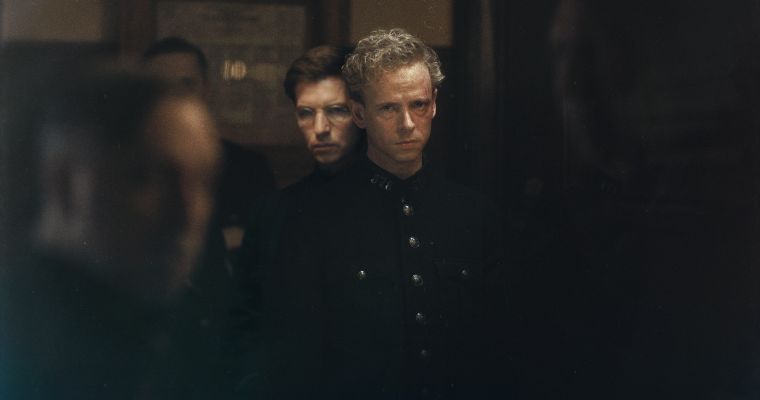
Matteo Simoni as Lode Metdepenningen and Stef Aerts as Wilfried Wils in a scene from "Wil." (Photo courtesy of Kinepolis Film Distribution)
“Wil”: While Tom Wilkin and Geoffrey Morton were dealing with terrorist attacks in Palestine, the Nazi occupation continued to grow across Europe. This tense, tightly constructed potboiler, based on the novel by Jeroen Olyslaegers, shares some similarities with the films I've reviewed thus far. Like “Shoshana,” it attempts to balance societal upheaval with intimate personal relationships. Like “The Goldman Case,” it's shot in the 1.33:1 Academy aspect ratio.
But “Wil's” director/co-screenwriter, TV vet Tim Mielants (“Peaky Blinders,” Marvel's “Legion”), succeeds in striking a balance that conveys the Nazi regime's threat without losing sight of the not-so-average Joe at its center and his growing dilemma. That would be Wilfried Wils (Stef Aerts), an artist serving as an auxiliary officer in the police force of Antwerp, Belgium, circa 1942.
His superior puts his orders in easy-to-understand terms: “You stand by and you watch.” That simple command falls by the wayside when he and fellow officer Lode (Matteo Simoni) cross paths with a “feldengarm,” a Nazi officer who orders the young lads to help him round up a Jewish family.
Things don't go quite as planned, and the boys end up with a real pickle on their hands. But rather than lean into Wil's predicament, Mielants prioritizes the friendship that develops between the two officers, as well as the emotional minefield the protagonist walks into when he becomes smitten with Lode's sister Yvette (Annelore Crollet). Initial mistrust gives way to mutual attraction.
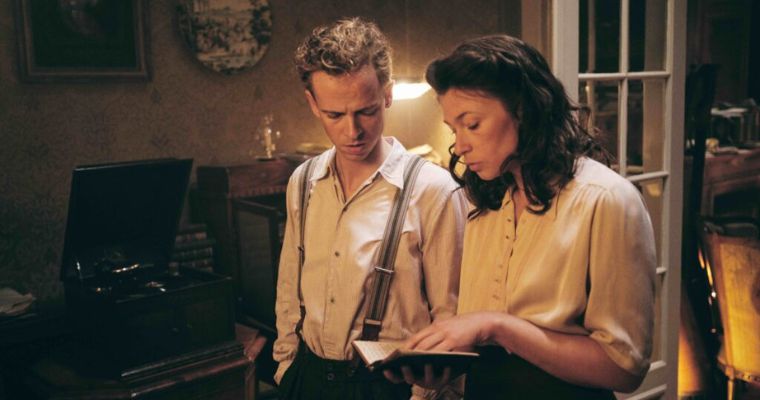
Stef Aerts as Wilfried Wils and Annelore Crollet as Yvette Metdepenningen in a scene from "Wil." (Photo courtesy of Kinepolis Film Distribution)
But Wil is being pulled from all directions, as the walls close in around him. His well-to-do benefactor nurtures his artistic impulse but cannot contain his hatred of Jews. Wil has also caught the attention of Nazi officer Gregor Schnabel (Dimitrij Schaad), who behaves like a younger version of “Inglourious Basterds'” Hans Landa.
It's Aerts, however, who more thoroughly commands our attention. His face is familiar in a way that might have you wondering who he reminds you of. His looks are reminiscent of quite a few actors. It's as if Michael Biehn, Klaus Kinski, John Cameron Mitchell, Joel Grey, Lothaire Bluteau, Peter MacNicol and Andrew Scott were tossed into the Osterizer. The star's charisma and screen presence, however, are all his own.
As for Mielants, he skillfully orchestrates the disparate elements that come together in “Wil.” The filmmaker is driven by a brusque willingness to get on with it. Alas, he ends up biting off more than he can chew, and the movie gets bogged down by a surplus of incidents. But even as it juggles too many balls in the air, “Wil's” messy, imperfect central trio guide the film past its excesses. It bears silent witness to the unspeakable horrors, through the eyes of a young man whose struggle for survival exacts a terrible price.
“Wil” screens Wednesday, Jan. 24 at 8:30 p.m. at Miami Theater Center in Miami Shores.
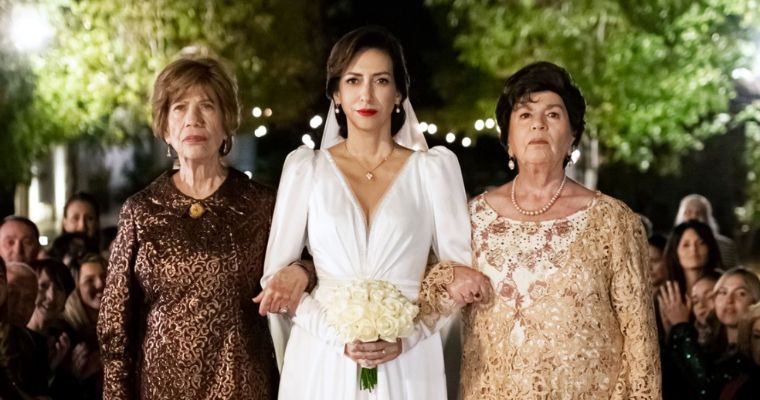
Rivka Bahar as Grazia, Reymonde Amsallem as Marie and Tikva Dayan as Hana in a scene from "Seven Blessings." (Photo courtesy of United King Films)
“Seven Blessings”: It comes as no surprise that the best film in this quintet is the only set in this century, and the only one that doesn't aim to bring history to life. Rather, Israel's official entry for this year's Academy Award for Best International Film zeroes in on a deeply dysfunctional Jewish Moroccan family's history.
The starting point, as is often the case for a dramedy like this, is a wedding. Marie (Reymonde Amsallem) and Dan (Eran Mor) are joined together in holy matrimony, but the ceremony and reception are just the beginning of their ordeal, er, celebrations. The traditional blessings bestowed upon the newlyweds continue through the next seven nights, during which one of Marie's family members hosts a dinner in the happy couple's honor.
Seven nights in a row. With family members who, let's be real, don't see eye to eye with Marie. As for the bride, she has her own resentments concerning her siblings, her mother Hana (Tikva Dayan) and her Aunt Grazia (Rivka Bahar). One of them in particular is a doozy. It doesn't take long for polite conversation to go out the window. The gloves come off, early and often. Night after night.
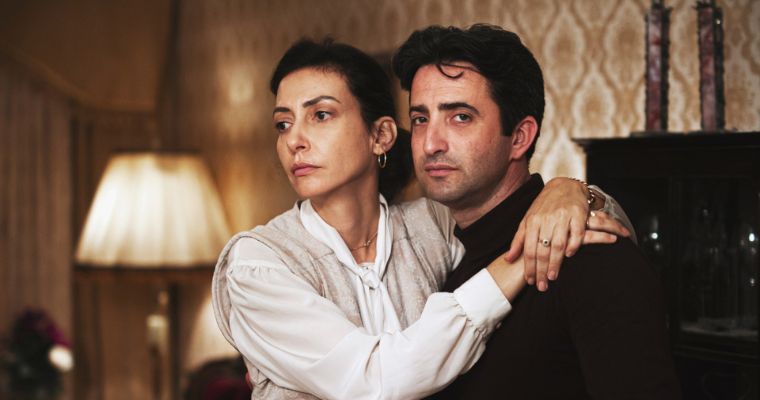
Reymonde Amsallem as Marie and Eran Mor as Dan in a scene from "Seven Blessings." (Photo courtesy of United King Films)
Director Ayelet Menahemi, working from a screenplay credited to Amsallem and Eleanor Sela, trust viewers to learn who's related to whom. It takes a while, but you find your footing amid the cheerfully chaotic mise en scene. Miraculously, the arguments never get old, because the filmmakers introduce each get-together at different points, effectively keeping you on your toes. One minor quibble: not enough food porn, although the fleeting glimpses we do get are tantalizing enough.
“Seven Blessings” might appear to be genteel matinee fare. Not the case at all. It's raw, uncompromising and brutally honest about the ties and bind and constrict. It also features one of the more realistic sex scenes involving a married couple (not Marie and Dan) that this reviewer has ever seen. Seeing this terrific ensemble cast play this clan as they bicker, fight, make up and have intense heart-to-hearts makes you happy, sad, angry, frustrated and ultimately, deeply grateful that there's a movie out there that's so unvarnished about the twin helixes of love and hate that can keep the members of a family together, and tear them apart. This is one tough cookie of a movie. Also, a blast.
“Seven Blessings” screens Tuesday, Jan. 23 at 6 p.m. at Miami Theater Center in Miami Shores.
For tickets and more information about the 27th Miami Jewish Film Festival, go to miamijewishfilmfestival.org. See you at the movies.




